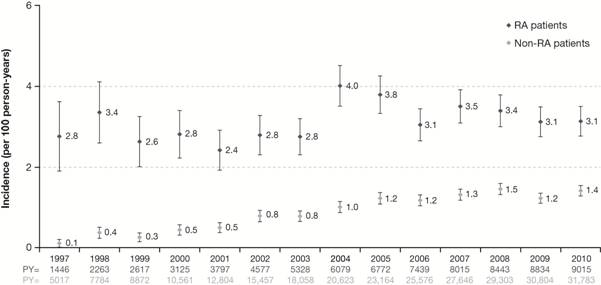Session Information
Title: Epidemiology and Public Health (ACR): Rheumatoid Arthritis and Systemic Lupus Erythematosus Outcomes
Session Type: Abstract Submissions (ACR)
Conclusion: Decrease in the IRs of musculoskeletal surgeries in 2005/2006 could be attributed to greater availability of biologic therapies. However, these rates have not decreased in recent years, suggesting there is an unmet need for more effective therapies. CRP levels at diagnosis were associated with higher risk of surgeries, suggesting that therapies reducing CRP may be effective to further lower surgical rates. 
Disclosure:
H. Cawston,
OptumInsight,
3,
Bristol-Myers Squibb,
5;
F. Bourhis,
None;
T. Le,
BMS,
3;
E. Alemao,
Bristol-Myers Squibb,
1,
Bristol-Myers Squibb,
3.
« Back to 2014 ACR/ARHP Annual Meeting
ACR Meeting Abstracts - https://acrabstracts.org/abstract/musculoskeletal-surgeries-and-procedures-in-patients-with-ra-results-from-a-uk-retrospective-study/
